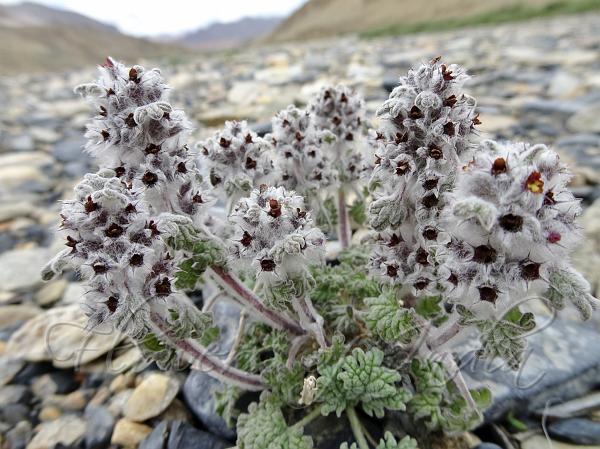|
| Alpine Horehound |
|

|

| File size | 809001 |
| Original date | 7/26/23 1:21 PM |
| Resolution | 2048 x 1536 |
| Flash | Flash did not fire, auto |
| Focal length | 4.1mm |
| Exposure time | 1/400s |
| Aperture | 3.5 |
| Focus Distance | |
| Metering Mode | Multi-segment |
| Camera make | SONY |
| Camera model | DSC-HX90V |
| Sensor type |
|
|
|
|
Photo: |
Botanical name: Marrubium marrubiastrum Family: Lamiaceae (Mint family)
Synonyms: Lagopsis marrubiastrum, Marrubium lanatum, Molucella marrubiastnum
Synonyms: Lagopsis marrubiastrum, Marrubium lanatum, Molucella marrubiastnum
Alpine Horehound is a distinctive high alpine plant
with flowers borne at branch-ends, in spike-like clusters of congested
verticillasters, densely white-woolly, 2-6 cm long. Flowers are about 5
mm, long, brownish yellow, peeping out from the mass of white-woolly
sepals and bracts. They are narrow tubular, externally hairy; upper
lobe 1 mm, entire, rounded, straight; lower lip with 3 short lobes;
tube straight, narrow. Stamens do not protrude out. Sepal-cup is narrow
tubular - funnel-shaped, 8-10 mm, firm-textured, not two-lipped; teeth
5, all equal, 2.5-3 mm, spine-tipped. Bracts are thread-like,
subulate, shorter than sepals. Stems are several, usually unbranched,
10-15 cm, rising up or erect, four-edged, purplish or not, densely
white woolly when young. Leaves are mostly basal or not, 1-2 x 1-2 cm,
broadly ovate to almost circular in outline, deeply lobed, with a dense
or very dense woolly indumentum of long hairs on both surfaces and
stalkless oil globules below; leaf-stalk 1-1.5 cm. Nutlets are 2.5 x
1.6 mm, greyish, triquetrous, at tip rounded. Alpine Horehound is found
in SW Siberia to Mongolia and Ladakh. Flowering: August-September.
| Identification credit: Tabish | Photographed in Ladakh. |
• Is this flower misidentified? If yes,